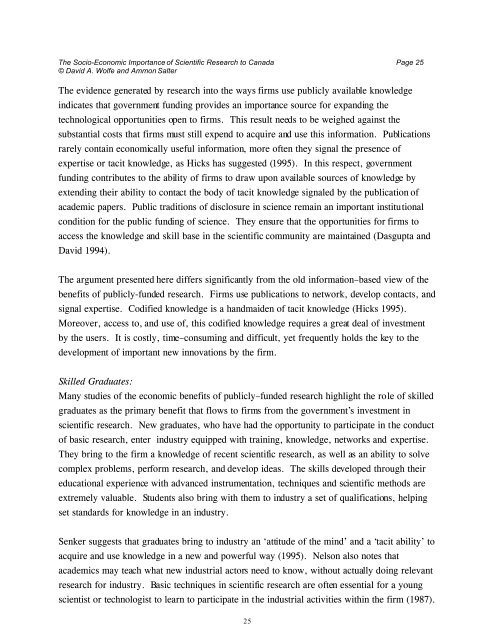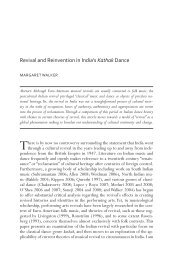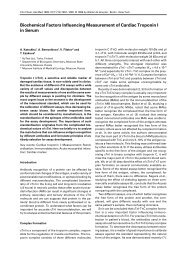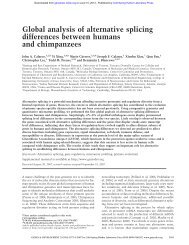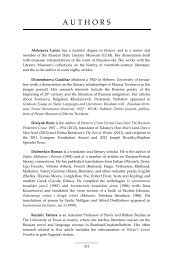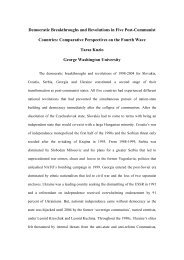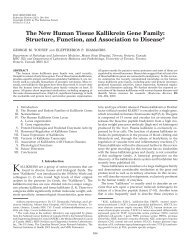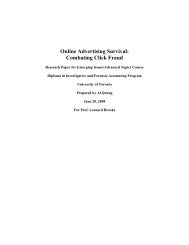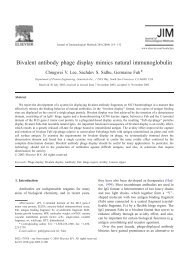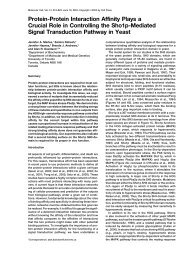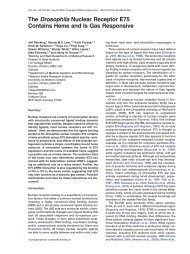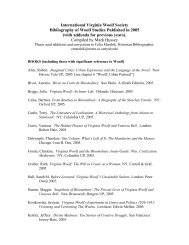The Socio-Economic Importance of Scientific Research To Canada
The Socio-Economic Importance of Scientific Research To Canada
The Socio-Economic Importance of Scientific Research To Canada
You also want an ePaper? Increase the reach of your titles
YUMPU automatically turns print PDFs into web optimized ePapers that Google loves.
<strong>The</strong> <strong>Socio</strong>-<strong>Economic</strong> <strong>Importance</strong> <strong>of</strong> <strong>Scientific</strong> <strong>Research</strong> to <strong>Canada</strong> Page 25© David A. Wolfe and Ammon Salter<strong>The</strong> evidence generated by research into the ways firms use publicly available knowledgeindicates that government funding provides an importance source for expanding thetechnological opportunities open to firms. This result needs to be weighed against thesubstantial costs that firms must still expend to acquire and use this information. Publicationsrarely contain economically useful information, more <strong>of</strong>ten they signal the presence <strong>of</strong>expertise or tacit knowledge, as Hicks has suggested (1995). In this respect, governmentfunding contributes to the ability <strong>of</strong> firms to draw upon available sources <strong>of</strong> knowledge byextending their ability to contact the body <strong>of</strong> tacit knowledge signaled by the publication <strong>of</strong>academic papers. Public traditions <strong>of</strong> disclosure in science remain an important institutionalcondition for the public funding <strong>of</strong> science. <strong>The</strong>y ensure that the opportunities for firms toaccess the knowledge and skill base in the scientific community are maintained (Dasgupta andDavid 1994).<strong>The</strong> argument presented here differs significantly from the old information–based view <strong>of</strong> thebenefits <strong>of</strong> publicly-funded research. Firms use publications to network, develop contacts, andsignal expertise. Codified knowledge is a handmaiden <strong>of</strong> tacit knowledge (Hicks 1995).Moreover, access to, and use <strong>of</strong>, this codified knowledge requires a great deal <strong>of</strong> investmentby the users. It is costly, time–consuming and difficult, yet frequently holds the key to thedevelopment <strong>of</strong> important new innovations by the firm.Skilled Graduates:Many studies <strong>of</strong> the economic benefits <strong>of</strong> publicly–funded research highlight the role <strong>of</strong> skilledgraduates as the primary benefit that flows to firms from the government’s investment inscientific research. New graduates, who have had the opportunity to participate in the conduct<strong>of</strong> basic research, enter industry equipped with training, knowledge, networks and expertise.<strong>The</strong>y bring to the firm a knowledge <strong>of</strong> recent scientific research, as well as an ability to solvecomplex problems, perform research, and develop ideas. <strong>The</strong> skills developed through theireducational experience with advanced instrumentation, techniques and scientific methods areextremely valuable. Students also bring with them to industry a set <strong>of</strong> qualifications, helpingset standards for knowledge in an industry.Senker suggests that graduates bring to industry an ‘attitude <strong>of</strong> the mind’ and a ‘tacit ability’ toacquire and use knowledge in a new and powerful way (1995). Nelson also notes thatacademics may teach what new industrial actors need to know, without actually doing relevantresearch for industry. Basic techniques in scientific research are <strong>of</strong>ten essential for a youngscientist or technologist to learn to participate in the industrial activities within the firm (1987).25


